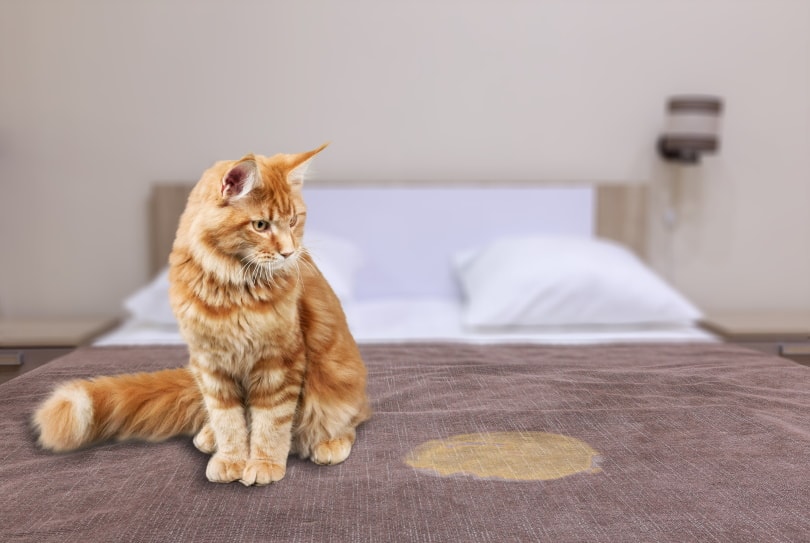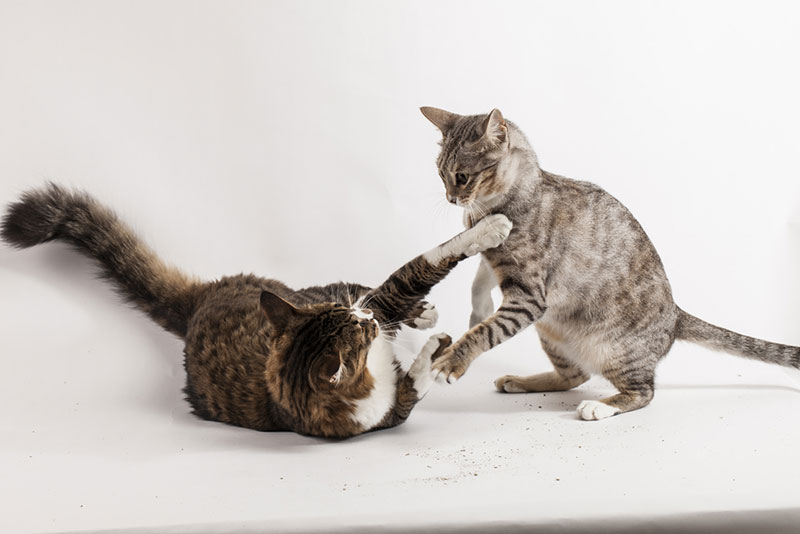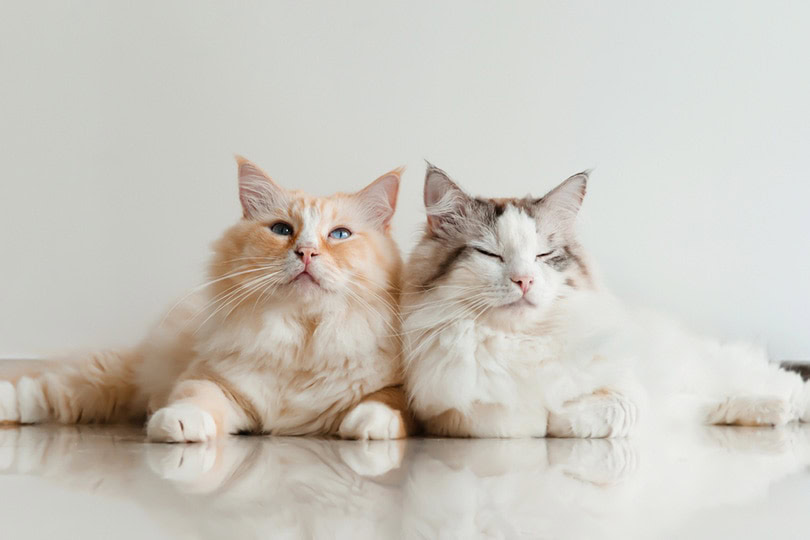VET APPROVED

The information is current and up-to-date in accordance with the latest veterinarian research.
Learn more »Click to Skip Ahead
Your bed is your safe haven at the end of the day and a place most of us can’t wait to crawl into after a hard day’s work. For many cat lovers, it’s a place where you can lie down, relax, and get in all the kitty snuggles you desire. One of the last things you’d like to find when you crawl into your cozy bed is a pile of cat poop. After all, it can put a damper on your evening, and your night’s sleep.
So, if your cat has been skipping over the litter box and using your bed to go number two instead, we are here to help. Finding out the root cause can be a process of elimination. Below we will go over the potential causes for this behavior and some tips on how to solve this stinky, messy problem.

Effectively Cleaning Pet Messes
The first part of cat mess prevention is ensuring you are taking the time to properly clean any accidents so they don’t return to the same spot – and that starts with investing in the right products! Of course, you’ll want to opt for something safe first and foremost, to protect your feline’s health, but secondly, you’ll need a solution powerful enough to lift the toughest, stinkiest, most set-in stains. An enzyme cleaner is a great go-to option to do just that.
Our Favorite Product
Hepper Advanced Bio-Enzyme Pet Stain & Odor Eliminator Spray is our favorite all-purpose cleaner for pet messes. It permanently lifts the very worst stains and odors, making clean up and accident prevention breeze. Hepper offers a 100% guarantee, which is a great bonus! Learn more about it here.
- ADVANCED ENZYMATIC CLEANER - Penetrates the most stubborn smells and stains at the deepest molecular...
- FOR ANY MESS, ON ANY SURFACE - This pet odor eliminator cleans your carpets, floors, furniture,...
- FRESH, NATURAL ODOR - Our unique formulation doesn't rely on dangerous or unpleasant chemical...
At PangoVet, we’ve admired Hepper for many years, and decided to take a controlling ownership interest so that we could benefit from the outstanding products of this cool cat company!

The 7 Reasons Why Your Cat Poops on Your Bed
1. Health Issues
Illnesses leading to diarrhea or constipation, underlying organ disease, or even parasites can cause changes in a cat’s bathroom habits and could potentially lead your cat to begin pooping on the bed, especially if there is urgency and pain associated with it. Some cats will associate their litter box with pain and discomfort, either due to having painful joints in the case of older cats, recovering after an injury, or experiencing actual pain while passing urine or feces due to many medical causes. All of this may prompt them to try and avoid the place they associate with the pain, which is the litter box. Senior cats suffering from arthritis may begin struggling to get into the box in the first place, and if they have mobility issues, it may be easier for them to use your bed. While there are many other reasons for this behavior, the first step you should take is to have your cat examined by your veterinarian to rule out any potential health issues that could be causing this unusual behavior. If your cat gets a clean bill of health, then you can begin looking into other potential reasons.

- What You Can Do
Because a sudden change in bowel habits can be the result of an underlying medical condition, you need to contact your veterinarian immediately so that you can have your cat properly examined and diagnosed to rule out any illness, such as inflammatory bowel disease, many other possible causes for diarrhea, constipation that will lead to painful straining or parasitic infestations.
2. Your Cat Is Under Stress
Cats tend to stress very easily, especially if there has been a change in their routine or environment. When cats are experiencing high levels of stress, their behavior and habits can change suddenly and may even cause you concern for their overall health. Pooping on the bed could be a result of stress or overall unhappiness with what’s going on in their lives.
If you have recently brought a new cat home, your other cat may naturally be anxious and unsure due to the new unfamiliar scents and a new presence in their home. Pooping on the bed may also be a way for them to mark their territory due to competition for resources in a multi-cat household. If you have recently moved homes, remodeled, added a new addition to the household, or even had guests in and out of the home, this can cause your cat to experience high loads of stress and insecurity.
If you notice any significant behavioral differences, you need to reach out to the veterinarian for an evaluation. If your cat has recently started pooping on your bed after a noticeable change in lifestyle or routine, this could very well be the reason for the behavior.
- What You Can Do
Your cat may be stressed due to something that you would not even think to consider. It’s important to take a close look into your overall environment, and think about any changes that have been made to your overall lifestyle or even ones that just affect your cat. Once you determine the root cause of the stress, you can begin to find ways to cope with the problem and help your kitty relax and feel more comfortable. Pheromone sprays are a useful tool to bring some familiarity and reassurance to your cat during this stressful time, so it’s important to anticipate any changes ahead of time and act accordingly.
In some cases of stress, your veterinarian may recommend calming supplements, or even medication to help calm them and get them through a more trying period.
3. Placement of the Litter Box
Let’s face it, cats can be picky. For every cat that is easy to please, you’ll have another that is super-finicky about their environment. Placement of the litter box can cause elimination issues and could result in your cat preferring to use your bed as a litter box, rather than the litter box itself.
Cats tend to like privacy when they go to the bathroom. This is completely natural, as going to the bathroom makes them vulnerable to larger predators in the wild. Most cats will prefer their litter box to be placed in a low-traffic area where they can get their privacy. If you have your litter box in a high-traffic area that does not allow them any peace, this could be the reason they sneak off into the bedroom to do their business.
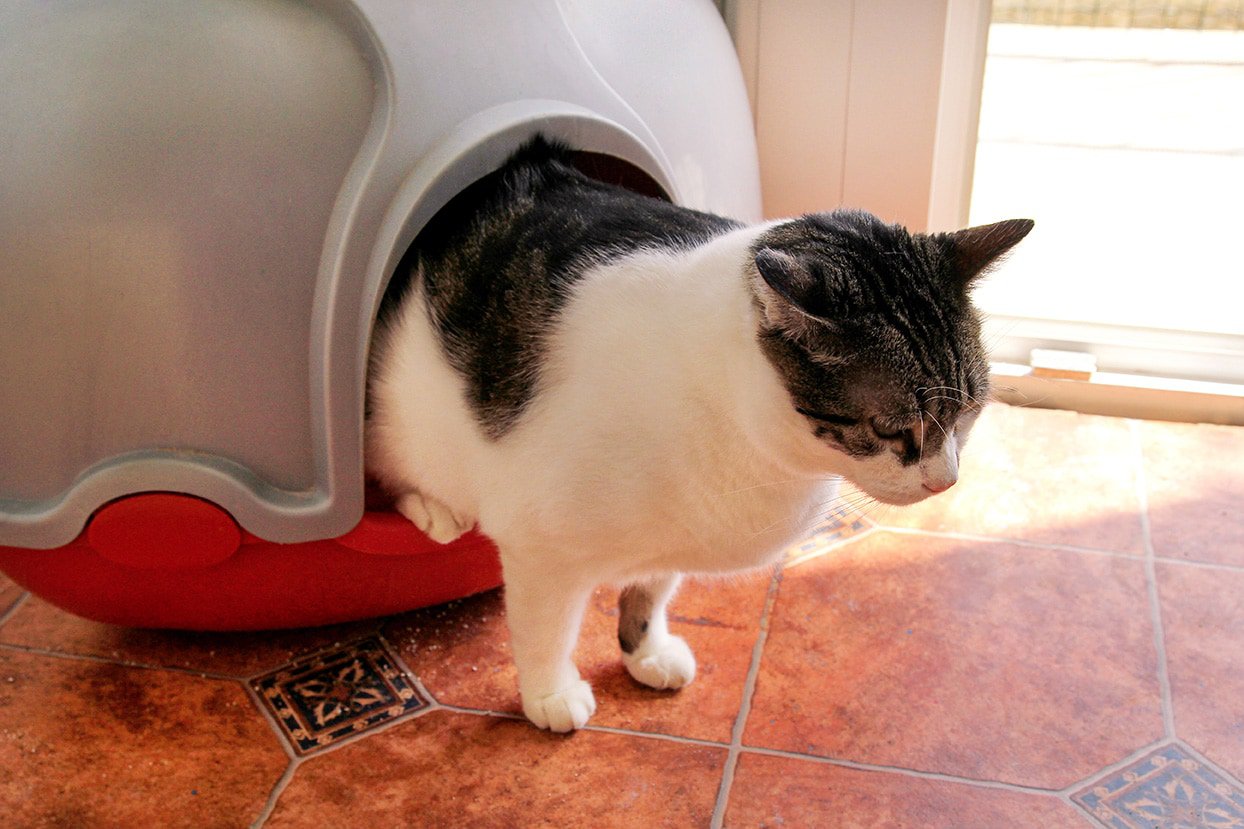
- What You Can Do
Sometimes we just have to bend to the will of our cats. If litter box location is the problem, try to find a quiet area somewhere in the house to move it to. Giving your cat their privacy may be the solution you need to keep them off your bed. Once you locate a more ideal area for the litter box, be sure to introduce your cat to the new placement.
4. The Litter Box Is Not Clean Enough
Our clean and tidy little felines don’t like to settle for less than what they deserve. If you have been slacking on getting the litter box cleaned up regularly, this could be your issue. Your cat wants a nice, clean area to do their business, stepping in their waste is not their preference and this can cause some cats to find alternative places to go.
- What You Can Do
This is a simple issue to fix if you find this is the most likely cause for your cat’s new and very unwelcome bathroom habits. Simply clean the litter box out thoroughly, replace the old litter with new, fresh litter, and introduce your cat to the cleanliness. Of course, make sure to keep up with regular litter box cleaning to stop this issue from happening in the future.
5. There Are Not Enough Litter Boxes for Your Multi-Cat Home
Multiple cat households may find that they do not have a sufficient number of litter boxes in the home. It is recommended to have one litter box per cat in the home, plus one extra. Some cats will refuse to share their litter box with others and this may prompt them to start finding other places to relieve themselves. If you do not have at least one litter box per cat, this could be your issue.
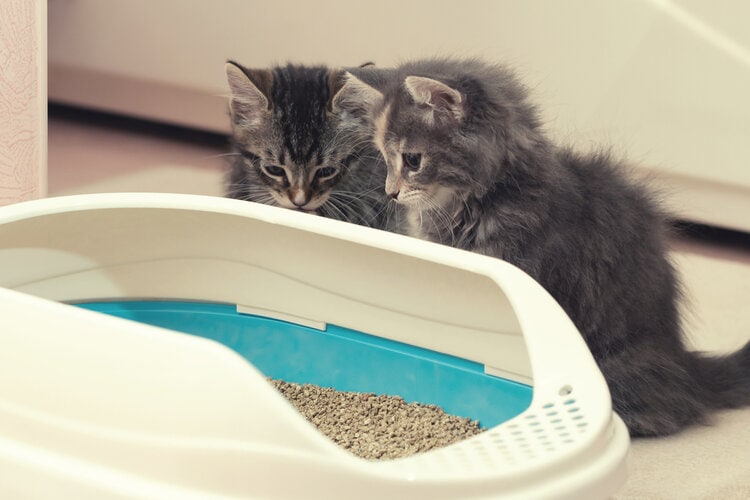
- What You Can Do
Since it is advised to have one litter box per cat in the household plus an additional one, make sure you have the right number of boxes you need for the cohort of kitties in your home. Make sure you introduce your cats to the newest litter box additions so that they are aware of their placement and hopefully you’ll have your icky problem solved.
6. Size or Style of the Litter Box
This is another one of those times that the finicky tendencies of some cats may be the reason they are pooping on your bed. This also goes hand-in-hand with changes in the environment. As small as it may seem, a simple change in the type or even size of the litter box could be the underlying reason you’re always washing your sheets.
Some cats can transition litter boxes with no problem however, some will have more specific preferences. For example, some cats prefer hooded boxes for security while others prefer open boxes that don’t make them feel so trapped. You may notice your cat is having a hard time adjusting to a new top-entry litter box when they are used to walking right in. Larger cats may not be comfortable going in smaller-sized boxes, while kittens may need something smaller to start.
- What You Can Do
If you just recently changed the style or size of your cat’s litter box and they suddenly began using your bed, you may need to consider the switch as the reason. No one will be able to pick up on your cat’s preferences better than you. This can take time, especially with new cat owners or cats that are new to the home. This may be the process of elimination but it’s worth trying different types of boxes until you find the perfect fit. If you recently changed the box type, consider switching back to the box they were comfortable with.
7. Litter Type or Texture
The type of litter is another factor that can play a larger role in a cat’s bathroom habits than you may imagine. After all, there are many different litter types and textures on the market today and it’s natural for cat lovers to try out different types to see what works best. Some cats may not like the feel, texture, or even smell of a new litter type, while some may be too dusty.
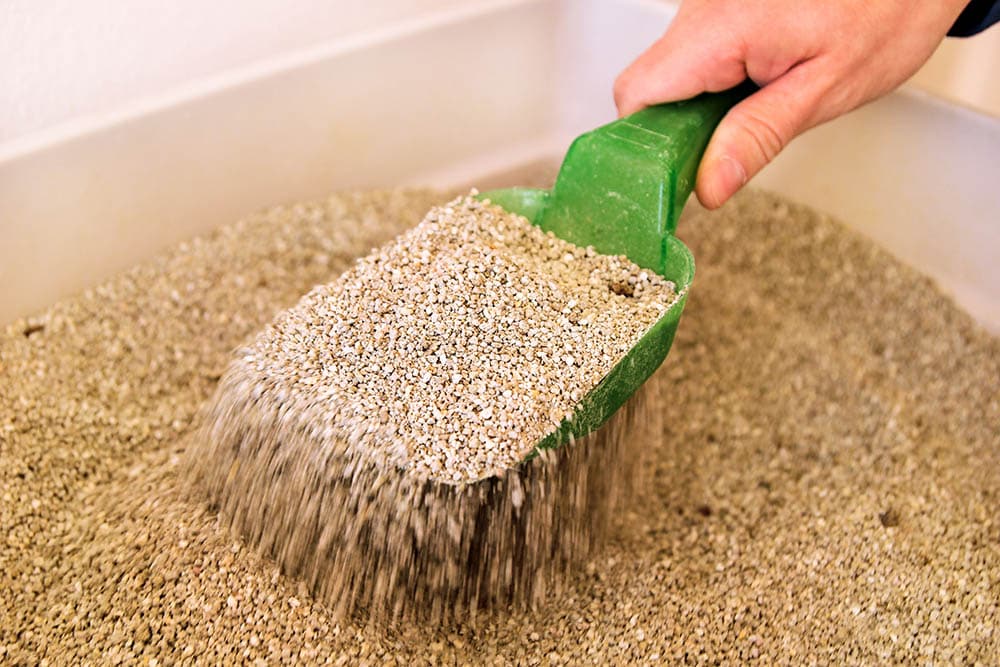
- What You Can Do
If you recently swapped your litter for a different type or texture and then noticed your cat going number two in the bed, you may have found your problem. Try switching the litter back to one that is comfortable for your cat or one that is similar. If you are unable to use that type of litter anymore, try out a different type, as there are many different kinds available including clay, silica, pine, paper, wheat, corn, and more. You will need to find one that works for both you and your precious kitty.

Conclusion
If your cat has recently picked up the habit of using your bed as a place to poop, you’re going to want this nightmare to end as soon as possible. Make sure you reach out to your veterinarian to ensure there are no underlying health issues that are causing the behavior. Finding the root cause can be a process of elimination but hopefully, now that you know the potential reasons, you can try and get this issue solved once and for all.
See Also:
- Why Do Cats Bury Their Poop? Is It Instinctual? Cat Behavior Explained
- How To Get Cat Urine Smells & Stains Out Of Shoes (with Pictures)
- Why Does My Cat Poop in the Tub? (6 Potential Causes)
Featured Image Credit: Billion Photos, Shutterstock
